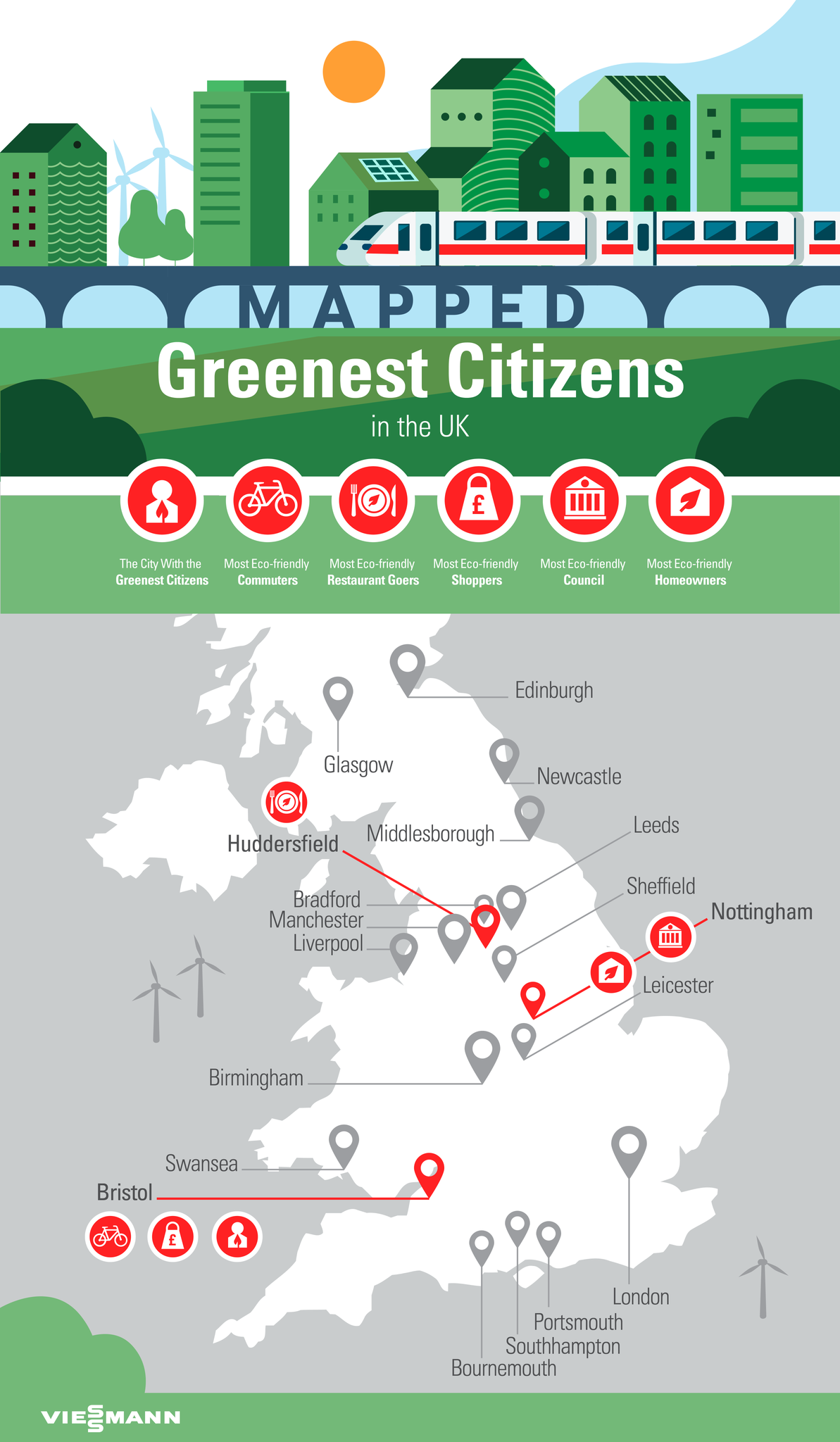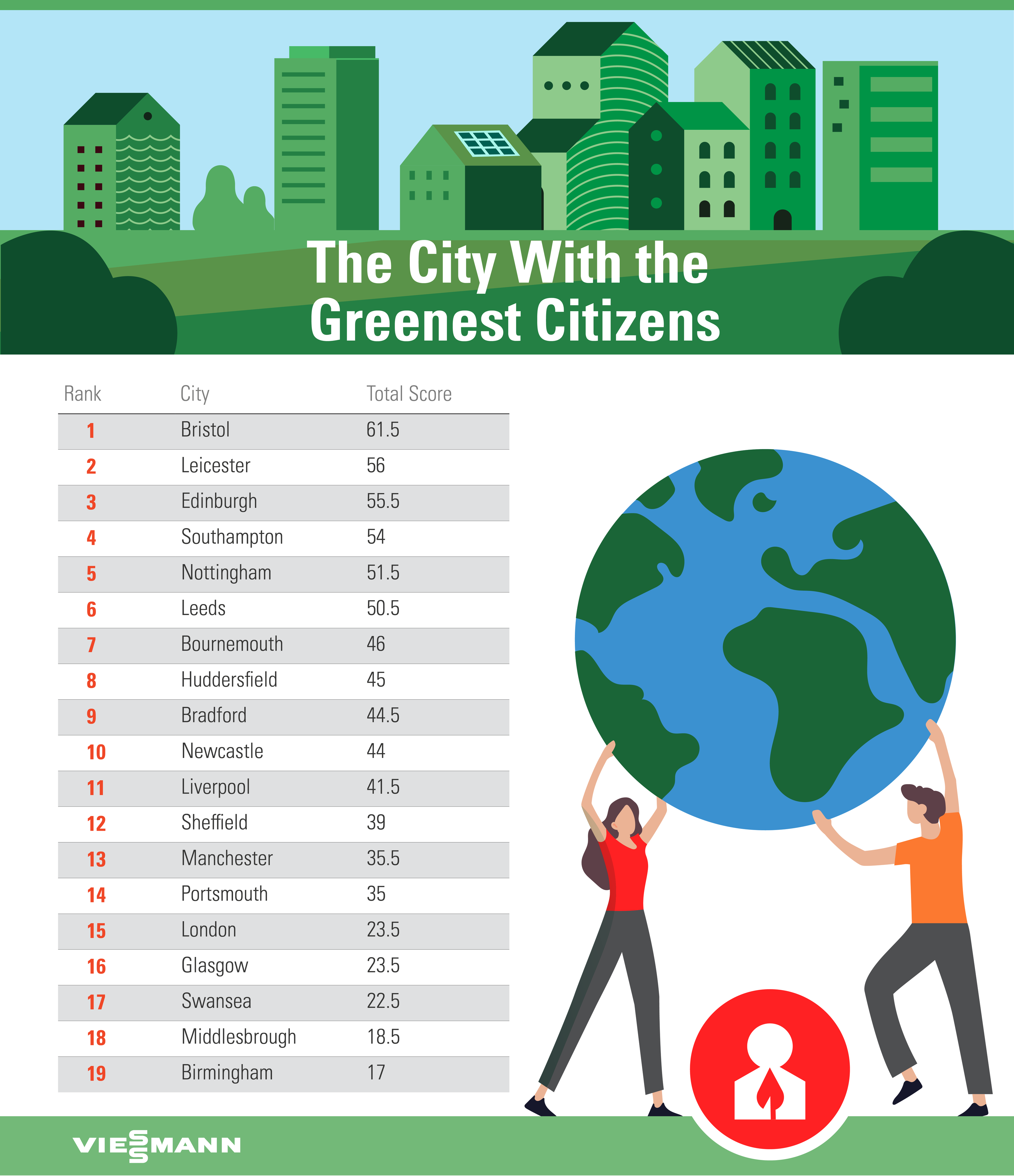Cookies help us deliver our services. By using our services, you agree to our use of cookies.
Welcome to Viessmann United Kingdom!
Viessmann United States

As the stark reality of the climate crisis comes to light, the need to adopt more environmentally-friendly ways of life becomes more and more urgent. At all levels of society - from governments, to businesses, to individuals - we need real change now if we’re to avoid the worst outcomes of climate change.
Here at Viessmann, we’ve highlighted 19 locations in the UK that are taking positive steps towards protecting the environment, and ranked them according to how planet-friendly they are. We’ve identified the city with the UK’s greenest citizens by considering the following five unique indicators - the most eco-friendly commuters, restaurants, shoppers, councils and homeowners. In order to determine the indicators we used to score the different locations, we ran a survey asking 1,000 UK citizens what they consider to be good eco-friendly habits.
While it’s clear there’s still plenty of work to be done to achieve the key goal of limiting global warming to 1.5 degrees Celsius, we hope that our map inspires you to take action in the fight against climate change.
What is the greenest city in the UK?

When it comes to green living in the UK, our research suggests that the people of Bristol lead the way. The city ranks in the top two most environmentally-friendly locations when it comes to commuting and shopping habits, and the city council comes in joint first with seven other councils for its performance on green issues.
Of the 19 locations we ranked, Bristol has the highest proportion of people who commute by bike and the second highest proportion who get to work by foot. Bristol also appears to have more environmentally-conscious shoppers - there are 3,207 online searches for ‘charity shops near me’ from this location every month. The city’s council also performs well, with a 2030 target to achieve zero carbon city status.
The runners-up
Leicester follows closely behind Bristol in second position. According to our research, the city has a good all round performance, appearing in the top 10 for environmentally-sound commuting, dining, shopping and domestic energy consumption.
Edinburgh comes in third place. This Scottish capital appears in the top three for eco-friendly commuting, dining, shopping and council performance.
Which city has the most eco-friendly commuters?
According to the latest release on road transport and air emissions from the Office for National Statistics, greenhouse gas emissions from road transport accounted for a fifth of the UK’s total emissions. It’s clear that to reduce our impact on the environment, we need to make more eco-conscious choices when it comes to travel.
So where is this happening? Our research indicates that Bristol is home to the most sustainable commuters. One in seven (14.15%) workers in the city get to and from work by foot, and 6.08% commute by bike.
Edinburgh comes in second place, with the highest proportion (16.34%) of workers commuting by foot and 4.3% commuting by bike.
In third position, we have Southampton, with 12.56% walking or running to and from work, and 3.8% cycling.
Which city has the most eco-friendly restaurants?
According to a major study by the University of Oxford, avoiding meat and dairy is the single biggest way that people can reduce their impact on the planet. A special report by the UN’s Intergovernmental Panel on Climate Change (IPCC) has also called for people to eat less meat to combat climate change.
But, when it comes to plant-based dining, which city takes the top spot? Our research suggests it’s Huddersfield. With 809 restaurants offering vegan options per 1,000,000 people, this city appears to be outperforming all of the other locations we looked at.
Edinburgh follows closely behind with 808 restaurants per 1,000,000, and Bradford takes third place with 672.
Which city has the most eco-friendly shoppers?
Overproduction, overconsumption and wastefulness are all contributing to climate change, according to scientific research. The growing awareness of these problems has led to a rise in conscious consumerism.
So, which cities are catering for shoppers who are trying to make more sustainable choices? It seems that Bristol is paving the way. With 16 zero-waste or plastic-free shops per 1,00,000 people and an average of 3,207 online monthly searches for ‘charity shops near me’, this city seems to have the most environmentally-conscious shoppers.
Edinburgh again comes in second place, with 11 zero-waste or plastic-free stores per 1,000,00 population and 3,048 online searches for charity shops.
Leeds is next in line, with 15 sustainable stores and 2,017 charity shop searches per month.
Which UK council is the most environmentally friendly?
While people power is no doubt important, the policies of local authorities can have a major effect on how environmentally-friendly a location is.
To rank councils’ performance on climate change, we looked at their target years for achieving zero carbon and whether or not a Clean Air Zone is proposed or in place.
Eight councils are performing equally well, according to our research, with a goal year of 2030 to achieve zero carbon and Clean Air Zones in place or proposed. These councils are: Birmingham, Bristol, Edinburgh, Leeds, London, Newcastle, Portsmouth and Sheffield.
Which city has the most eco-friendly homeowners?
Moving away from our reliance on fossil fuels is also key if we’re to avoid the worst consequences of climate change.
We looked at the percentage of domestic solar panels in each of the 19 locations we examined to figure out which city is making the most progress in reducing fossil fuel consumption.
It seems that Nottingham is winning this race, with 4.6% of its domestic properties benefiting from solar panels. Newcastle comes next, with 3.7% of its domestic properties having solar panels fitted. Bournemouth takes third place as 3.46% of residents are harnessing solar energy.
Special mention to Glasgow
While Glasgow appears in 16th place in our rankings, the city deserves a special mention for hosting the historic UN Climate Change Conference of the Parties (COP26) this year. The summit brought nearly 200 countries together to speed up action on climate change. After two weeks of negotiations, all parties agreed the ambitious Glasgow Climate Pact, which keeps the goal of limiting global warming to 1.5 degrees Celsius in place
Top tips for greener living
The challenge of tackling climate change can seem daunting, but there are plenty of small changes you can make that can make a real difference. Why not start by following these 5 top tips?
- Walk or cycle to work
Forgoing the car and walking or cycling to work can not only reduce your own carbon footprint but it can also be beneficial to your physical and mental health. If your workplace isn’t within walking or cycling distance, try to use public transport instead. If you do need to use a car from time to time, consider switching to an electric vehicle.
- Eat a more plant-based diet
An international switch to plant-based diets could reduce greenhouse gas emissions by two thirds, according to Oxford Martin School researchers. And you don’t have to go fully vegan to make a difference. After all, it’s better to alter your habits a little than do nothing at all. You might decide to eat meat only once a month or you might decide you can only commit to one day off meat a week - the key is to try to make a change. View our blog on carbon friendly recipes.
- Shop with the planet in mind
Whether you’re shopping for groceries, clothes, household items or something else, ask yourself whether you really need the thing you’re looking for. If you do, how can you make your purchase more sustainable? Shopping at charity shops, zero-waste shops, thrift stores, second-hand sales and buying reused items online can all help to lessen your impact on the earth. If you have to buy new, try to choose eco-friendly products and businesses that have good environmental credentials.
- Speak up!
Doing your bit is great but encouraging others to do the same too is even better. From talking to your family, friends, neighbours and co-workers, to writing to your local MP, to lobbying businesses, to attending marches, there are plenty of ways you can get your voice heard and influence the people around you to make a positive difference.
- Switch to renewable energy
Moving from traditional energy sources to renewables can not only help to protect the planet, it can also make a big difference to your household bills. There are a variety of technologies to choose from including heat pumps, solar thermal systems, and fuel cell boilers. You could even be eligible for funding to install one of these systems through the Domestic Renewable Heat Incentive (RHI) scheme which ends in March 2022.
Want to share more ideas on fighting the climate crisis? Have any thoughts on our research findings? Let us know by joining the conversation on social media using #GreenestCitizens.

Which heat pump is the best for you?
- Boiler services - A complete guide for homeowners
- Is underfloor heating efficient?
- What temperature is a heat pump not effective?
- Why is my heat pump icing up?
- Do heat pumps need servicing regularly?
- Does a boiler cupboard need ventilation?
- How to hide a boiler in the kitchen
- Which boiler do I need for my home?
- Understanding the Boiler Upgrade Scheme
- Heat Pump Grants
- Eco homes around the UK
- Visualising a ‘net-zero’ Britain
- Visualising the number of trees needed to offset UK’s carbon footprint
- How to grow trees in the UK?
- Carbon labelling household activities
- What will the family of the future look like in 2050?
- 7 tips for making Bonfire Night 2020 one to remember
- How green do Brits think they are?
- The carbon labelling of Britain's favourite recipes
- The carbon footprint of (nearly) everything

Looking for a new heating system?
Get your free quote from a local installer
Customer Support